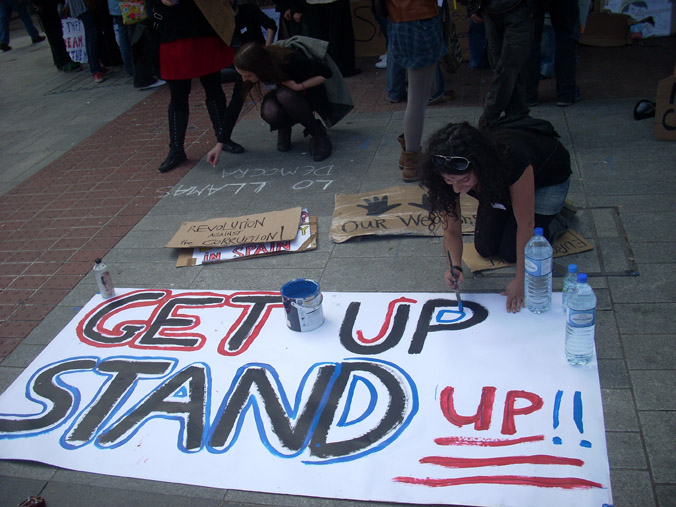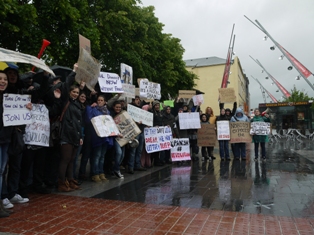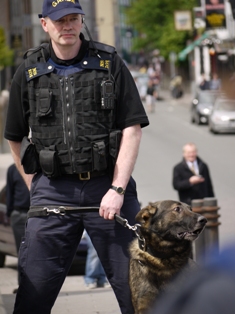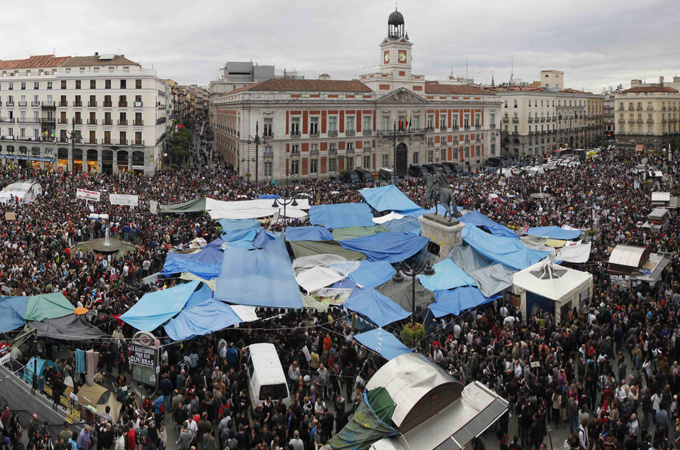Over 30 years of anarchist writing from Ireland listed under hundreds of topics
Spanish revolution on the streets of Cork...Again!

Following on from Saturday's Spanish Revolution solidarity protest in Cork City there was another big crowd on the street of the city Sunday. As the issues that have brought the people of Spain out to protest are just like those affecting people in Ireland and across Europe, there was many calls to make this movement international.
The solidarity group here plan to return to the Grand Parade every day this week to hand out information and discuss the events in Spain with passersby. This will be between 11am and 1pm, and from 6pm to 8pm. Come along and find out what's going on!
Spanish Revolution in Cork...
 Workers and students from the areas of Spain living here in Cork protested today on the Grand Parade in support and solidarity with the movement for ‘Real Democracy’ in their homeland. Over a hundred turned up in pouring rain to voice and sing their anger at the failure of capitalism and lack of hope and possibilities that is offered to us under the present ‘free market’ regime.
Workers and students from the areas of Spain living here in Cork protested today on the Grand Parade in support and solidarity with the movement for ‘Real Democracy’ in their homeland. Over a hundred turned up in pouring rain to voice and sing their anger at the failure of capitalism and lack of hope and possibilities that is offered to us under the present ‘free market’ regime.
Film Night: The Filth and the Fury (sex pistols rockumentary), Wedn 25th, 8pm, @solidaritybooks
Cork Protests The British Queen's Visit
 Spin and window-dressing were the order of the day this afternoon in Cork where a heavy-handed police presence ensured that the British Queen’s visit to the city could be presented to the outside world as ‘positive and welcoming’ and ‘a real Irish welcome’. A sizeable protest on Sullivan’s Quay was met with lines of riot police and police dogs guaranteeing that those who opposed the visit were kept far away from where they could be seen and heard.
Spin and window-dressing were the order of the day this afternoon in Cork where a heavy-handed police presence ensured that the British Queen’s visit to the city could be presented to the outside world as ‘positive and welcoming’ and ‘a real Irish welcome’. A sizeable protest on Sullivan’s Quay was met with lines of riot police and police dogs guaranteeing that those who opposed the visit were kept far away from where they could be seen and heard.
OBAMA - change you can’t believe in
 The election of Barack Obama to the White House in 2008 was one of the most celebrated electoral victories of recent times. Not since Nelson Mandela’s win in South Africa, following the collapse of the Apartheid regime, was the supposed power of the ballot box so publicly celebrated and displayed.
The election of Barack Obama to the White House in 2008 was one of the most celebrated electoral victories of recent times. Not since Nelson Mandela’s win in South Africa, following the collapse of the Apartheid regime, was the supposed power of the ballot box so publicly celebrated and displayed.
Obama’s victory was hailed as a triumph for the ‘democratic process’ and was widely touted as a fine example of how people power and electioneering can trump entrenched bigotry and money.
Obama + Internet + Money = HOPE
 The electoral system in the United States is notoriously conservative. Two political parties, the Republicans and the Democrats, dominate. To be a Presidential hopeful, you need to have stacks of money – to pay for advertising and campaign teams and so on and so forth. Usually this means courting big business and corporate interests in return for campaign donations.
The electoral system in the United States is notoriously conservative. Two political parties, the Republicans and the Democrats, dominate. To be a Presidential hopeful, you need to have stacks of money – to pay for advertising and campaign teams and so on and so forth. Usually this means courting big business and corporate interests in return for campaign donations.
As a former senator Obama was well aware of this situation and how things worked. Ultimately, however, his success lay in the fact that he mobilised in two distinct constituencies - among the business community but also amongst the grassroots voters. This latter aspect – his grassroots mobilisation - received considerable prominence because it was ‘news’ and noteworthy. His clear and unambiguous business friendly comments received less attention, but were nonetheless important.
A promise broken: Obama & Guantánamo Bay
 The Guantánamo Bay detention facility was created under George Bush’s Presidency in the aftermath of the attack on the World Trade Centre in New York in 2001. Described as ‘a place where normal legal rules’ do not apply, it quickly became infamous for harsh and extreme conditions of detention. Interrogators practiced a variety of torture techniques on prisoners at the facility including the now well known water-boarding procedure.
The Guantánamo Bay detention facility was created under George Bush’s Presidency in the aftermath of the attack on the World Trade Centre in New York in 2001. Described as ‘a place where normal legal rules’ do not apply, it quickly became infamous for harsh and extreme conditions of detention. Interrogators practiced a variety of torture techniques on prisoners at the facility including the now well known water-boarding procedure.
BACK to the FUTURE: Imagining the Future in a post-revolutionary world
 Editors’ Note:
Editors’ Note:
Much of our time as revolutionaries is spent on the routine of organising in the here and now – building a campaign, organising for a demonstration, planning for a trade union meeting…. Too often we don’t manage to take time to step back from the here and now and imagine or envisage what it’s all about. But without dreaming, without imagining a future the daily humdrum can seem dispiriting.
Peripherals Revolt: Spanish Square Occupation Movement Challenges Austerity and Worthless Elections
 Since the demonstrations called last Sunday, the central squares of cities all across Spain have been occupied by camps of protestors, furious at austerity and the uselessness of all the existing politicians and the pointlessness of this coming Sunday's local elections.
Since the demonstrations called last Sunday, the central squares of cities all across Spain have been occupied by camps of protestors, furious at austerity and the uselessness of all the existing politicians and the pointlessness of this coming Sunday's local elections.
The movement consists mainly of young people, both students and unemployed or precarious young workers calling themselves by names such as Juventud Sin Futuro (Youth Without Future) and #DemocraciaRealYa (Real Democracy Now!). Bypassing existing organisations, whether political parties or trade unions, the participants have organised themselves via Facebook and Twitter, in the manner of the Tunisian and Egyptian activists of the Arab Spring.
Re-building a trade union movement from below
 It is no exaggeration to say that the Irish trade union movement is in crisis. Even a cursory glance at trade union density figures demonstrates the depth of the crisis. Just 34% of the overall Irish workforce, and only a worryingly tiny 20% of part-time workers, are members of trade unions.[i]
It is no exaggeration to say that the Irish trade union movement is in crisis. Even a cursory glance at trade union density figures demonstrates the depth of the crisis. Just 34% of the overall Irish workforce, and only a worryingly tiny 20% of part-time workers, are members of trade unions.[i]

